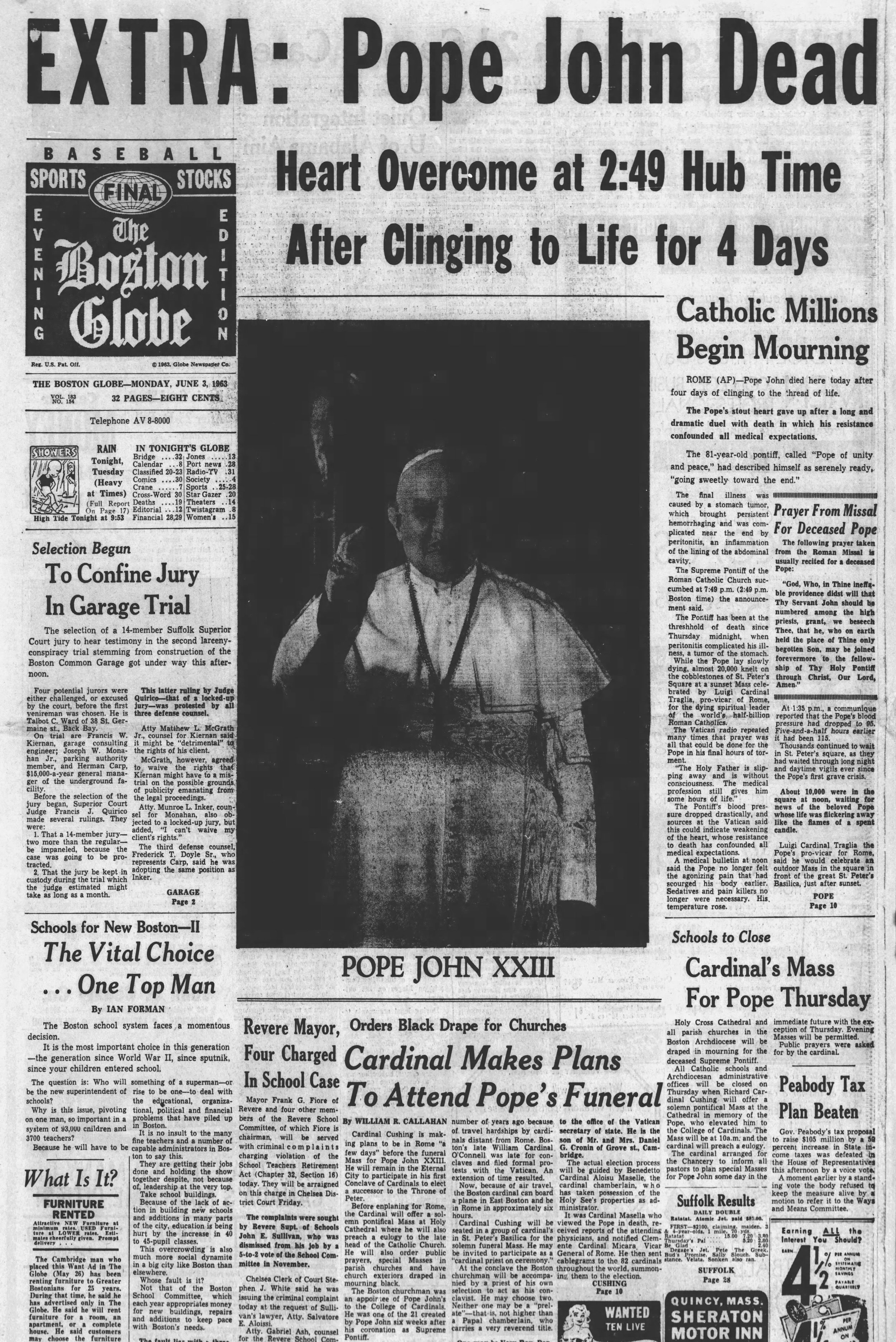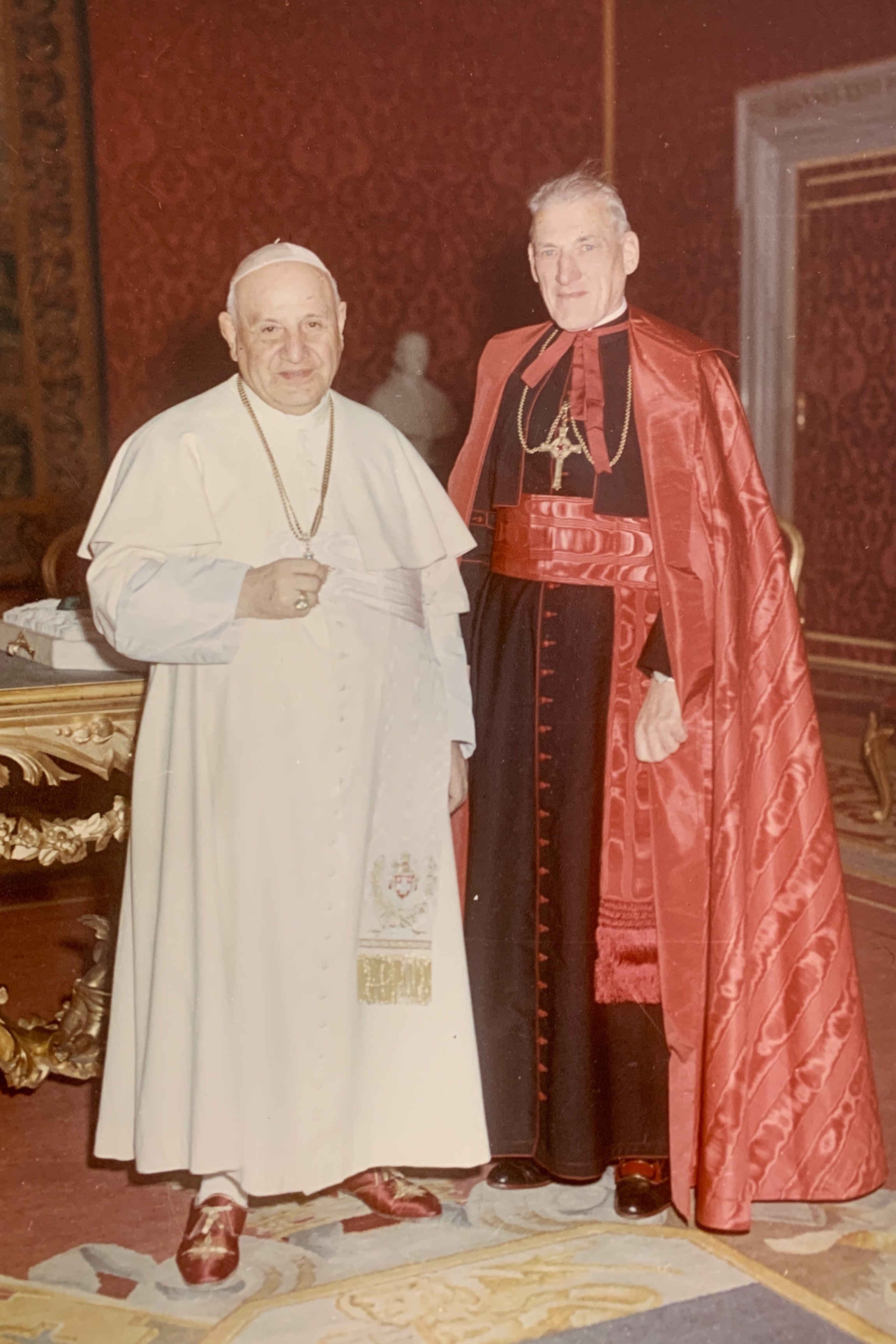Historians love archives and anniversaries. My recent archival trip to the Archdiocese of Boston got me to thinking about a pope’s death sixty years ago this month.
On June 3, 1963, the 81-year-old Pope John XXIII lay dying in his Vatican apartment as 20,000 faithful kept vigil in Saint Peter’s Square. Elected pope less than five years earlier, this son of Italian peasants had been typecast as a benign caretaker until he surprised the world by convening the Second Vatican Council, which ushered Catholicism into the modern age.
Stricken with stomach cancer, Pope John was surrounded by family and friends as the sounds of the Mass being said for him rose from the square below. At 7:49 p.m., soon after the chanting of the last words, Ite, missa est (“Go, the Mass is ended”), he stopped breathing.
Four thousand miles away, in Boston, Monsignor Francis Lally informed the archbishop, Richard Cardinal Cushing, that the pope had died. One of John XXIII’s first acts as pope had been to elevate Cushing and 22 others to the cardinalate. Like the pope, Cushing came from humble circumstances. The son of Irish immigrants from South Boston, he never lost his working-class persona, which endeared him to Bostonians after he became archbishop in 1944.
Besides their similar backgrounds, Cushing and Pope John were famously affable and shared a predilection for offhand remarks. A reporter’s observation about the pope could well have described Cushing: for “all his easy-going manner and joviality,” he “had a reputation for speaking plainly when he thought the situation warranted.”
Most important was the ideological affinity between the two men. Cushing was an outspoken champion of the pope’s reforming agenda, particularly the improvement of the church’s relations with non-Catholics.
In a statement to the press after the pope’s death, Cushing said John XXIII “was the best human reproduction of Christ that I have ever met” and announced that he would initiate a campaign for the pope’s canonization.
Three days later, Cushing celebrated a requiem Mass for the man he called “Good Pope John” at Boston’s Cathedral of the Holy Cross. Never one to miss an opportunity to make a statement, Cushing welcomed interfaith representatives to the liturgy. He even embraced several of them—an Episcopal bishop, a Greek Orthodox bishop, and a Lutheran synod president—with the “kiss of peace,” a gesture normally reserved for fellow Catholic prelates.
Speaking to the packed cathedral as an overflow crowd watched on closed-circuit television, Cushing said that John XXIII exemplified the title Pontiff, derived from a Latin root meaning “bridge builder.”
“He built a bridge between Catholic Christians and Protestant Christians, another between Christians of the West and those of the East, and a third between Christians and non-Christians,” the cardinal said. “It was a bridge built on respect for the conscientious religious convictions of all peoples, on mutual esteem and love among all the children of God.”
Cushing was also a bridge builder who frequently accepted invitations to speak in non-Catholic houses of worship and who cultivated interfaith alliances. One example was his friendship with Alexander Brin, publisher of Boston’s Jewish Advocate newspaper, who shared Cushing’s grief at the death of Pope John.
In an editorial three days after John XXIII’s death, Brin lauded the pope’s efforts to improve Jewish-Christian relations, including the removal of an old reference to “the perfidious Jews” in the Good Friday liturgy. “Religious figures of all faiths achieve greatness when they reach from without of their own denominational preference into the wide world of human suffering and treat mankind as their flock,” Brin wrote. The pope, he added, “has shown that a readiness to subject hallowed doctrines and practices to the most searching examination is fully compatible with faith.”
When Cardinal Cushing died of cancer seven years later, Brin praised his longtime friend in similar terms. In a front-page tribute in the Jewish Advocate, Brin called Cushing “one of the good men of this earth, a powerful voice and steady hand.” “No single American churchman,” Brin continued, “had a greater impact on our generation.”
Cushing’s ecumenical zeal first caught my attention years ago when I was researching the making of the Revised Standard Version of the Bible, a Protestant translation he later endorsed for Catholic use. But his ecumenism is but one facet of this complex and sometimes contradictory man, who is best known as the spiritual confidant of the Kennedy family. Cushing presided at the funerals of John F. and Robert Kennedy, and he later defended Jacqueline Kennedy when she married a divorced man, Aristotle Onassis, in violation of church rules.
Cushing is a neglected figure in scholarship, a gap I hope to fill with the biography I am writing. Many of the themes of his career, especially the problem of how to reconcile absolute doctrinal claims with religious pluralism, are still contentious today. The legacies of John XXIII and the Second Vatican Council are similarly debated. When Pope Francis was elected in 2013, one of his earliest acts was to canonize Pope John, bypassing the usual requirement of a second miracle attributable to his intercession. That shows how symbolically potent the Vatican II era remains.
Cushing is the American embodiment of that era’s optimism but also its upheaval. His life deserves reappraisal not only for its own sake but for the lessons it may hold for our own time.
© 2023 by Peter J. Thuesen. All rights reserved
Bibliographical Note
On the death of John XXIII, see Thomas Cahill, Pope John XXIII (New York: Viking, 2002), 214. On Monsignor Lally, see John H. Fenton, Salt of the Earth: An Informal Portrait of Richard Cardinal Cushing (Garden City, N.Y.: Echo Books, Doubleday, 1965), 146. John T. McGreevy notes John XXIII’s “penchant for offhand remarks” in Catholicism: A Global History from the French Revolution to Pope Francis (New York: W. W. Norton, 2022), 291. The description of John XXIII’s “easy-going manner and joviality” is from “John XXIII . . . Pope of Unity,” Associated Press, Boston Globe, June 4, 1963. William R. Callahan, “Movement On for Sainthood,” Boston Globe, June 4, 1963. “‘The Whole Human Family Is Desolate’ —Card. Cushing,” Boston Globe, June 4, 1963. Edward G. McGrath, “Tears, Prayers, as Cardinal Embraces Protestant Leaders,” Boston Globe, June 7, 1963. “Cardinal Cushing’s Eulogy of Pope John: ‘He Built a Bridge on Mutual Esteem, Love,’” Boston Globe, June 7, 1963. “Pope John XXIII” (unsigned editorial), Jewish Advocate, June 6, 1963. Alexander Brin, “Prelate Passes: A Tribute,” Jewish Advocate, November 5, 1970.
For support of my archival travel related to Cardinal Cushing, I gratefully acknowledge a Hibernian Research Grant from the Cushwa Center for the Study of American Catholicism at the University of Notre Dame.
Illustration credits: Boston Globe via Newspapers.com; John XXIII with Cardinal Cushing, courtesy of the Archive of the Archdiocese of Boston

